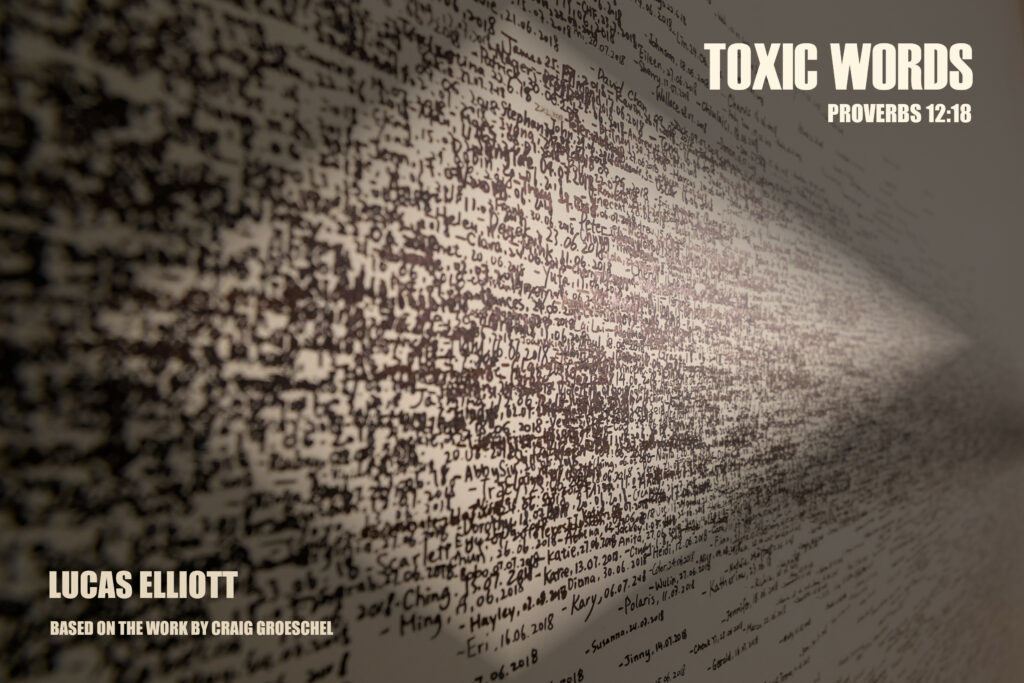
Originality Note: This topic is heavily inspired from pastor CRAIG GROESCHEL's Soul Detox Theory Devotional through RightNow Media. This topic was written to fit within a series for Launch Ministry at Hope Chapel in Sterling. Credit to Pastor Groeschel where appropriate.
How much would you say you talk each day? Probably quite a bit. Whether face-to-face, over the phone, or on social media, we’re constantly sharing our thoughts and hearing what others have to say, too. Why do we talk so much? Because language is a crucial tool. It’s something that God has gifted us. Something that no other creation really has. Words are how we communicate with each other, how we communicate with God, and they’re even how we communicate with ourselves. Our words, our language, is the framework we build each day on.
You’ve probably heard the saying “sticks and stones may break my bones but words will never hurt me.” It’s a popular phrase, but is it really true? Should it be? In Proverbs 12:18 it reads:
The Words of the reckless pierce like swords, but the tongue of the wise brings healing.
Proverbs 12:18
The Bible says that reckless words, toxic words, pierce like swords. Words can and do crush us.
Let’s focus for a moment on the word “toxic.” What exactly do we mean when we say words are toxic? Using toxic to describe things is a trend that started within the last couple of generations, but it does a very good job of describing the issue. When a chemical or material is toxic, it’s not instantly deadly. In fact, in small doses, it’s typically nothing to be concerned about. For some people, a toxic substance may affect them more than others. It matters how much of the material the person is exposed to, how it enters their body, and how healthy they are when it does.
Words are like that too. Some insults or harsh words might affect different people in different ways. Whether words are damaging to you depends on how it is said to you. It depends on who says it, how often you hear it, and it depends on how emotionally and spiritually healthy you are when you hear it.
Because the true context of how these words strike us are unique to the individual, it can be easy to dismiss toxic words someone else has experienced. That is where the phrase “sticks and stones may break my bones but words will never hurt me” comes from. When someone else is hurt by words, it’s easy for us to tell them it doesn’t matter. We didn’t hear those words directed toward us, so it’s easy to see where they’re false or not worth considering. We’re not in the same place, we don’t have the same pressure or relationships.
We’ve all had to deal with toxic words in our life, and we will in the future too.
“You don’t try hard enough”
“You don’t care what you think”
“I hate you”
“I wish I’d never met you”
“You’re stupid”
“You’re ugly”
“You’re selfish”
“You can’t do that you should give up”
“I wish I never had you”
“I like this person more than you”
We’ve all been hit by words that just crush us to our cores. Maybe they don’t hit us right away; some words haunt us later in life or make us doubt something or assume something about ourselves that isn’t true. But that right there is the thing: it isn’t true. Even if what someone said is true, when it cuts to your core it is twisted into something that is a lie. It’s twisted into something that pulls us apart and directly affects who we think we are. Satan is constantly whispering into our ears and reinforcing those toxic words and doubts.
So what do we do with these “toxic words” when we are faced with them? We need to take everything we heard and hold it to God’s standard. Does it align with what God teaches? Does it hold true to his promises, to his word? If not, throw it away. It has no meaning and no power over you.
We need to take everything we heard and hold it to God’s standard. Does it align with what God teaches? Does it hold true to his promises, to his word? If not, throw it away. It has no meaning and no power over you. Nothing can separate us from God. Nothing can overrule the worth you have to God. Nothing can overcome God’s plan for you.
It’s important to trust God and guard our hearts against toxic words. We can learn from them, sure, but it’s important to remember to give it to God; not to dismiss or ignore it, but to let God’s gift of righteousness take the sting away and transform you.
Toxic words, whether they come from a place of hate, hurt or even a place of love, are overcome by God’s power.
I can do all things through him who strengthens me.
Philippians 4:13
Now let us look back at Proverbs 12:18: “The words of the reckless pierce like swords, but the tongue of the wise brings healing.“
There’s another side to this coin. Uplifting words hold just as much power as toxic words, and they are the model for how we should be talking with each other.
I still remember when I lost a close friend of mine a handful of years ago. My mother homeschooled both myself and this friend of mine for a handful of years. This friend died of brain cancer, and the day she passed away a good number of close friends and family were at the hospital because the doctors knew it was her time. I was there at the St. Vincent hospital in the lobby with a family friend, Daniel, who had driven us there; my mother was worried she wouldn’t be able to drive back and I couldn’t drive yet.
I was there, but I couldn’t bring myself to go up and say goodbye. I waited in the lobby with that family friend and we talked about all sorts of stuff until eventually, it was time to go home. I was younger, and I know she knew I cared for her and that she was surrounded by people who loved her and could support her, but I still felt guilty and upset with myself. I felt guilty that I hadn’t been there, and I was also upset because I had recently heard God call me to be a pastor and I felt like I should have been able to handle it much better.
I shared some of this with Daniel, the family friend that drove us, and he told me that it was okay. He reminded me that she was going to a place of joy and pointed out all the ways I had been a friend to her throughout her life. He encouraged me and helped me trust that God was still calling me and that he would equip me.
Toxic words pierce like swords, but uplifting and good words are just as strong and can hold so much power. This is why the Bible tells us to uplift each other.
And let us consider how we may spur one another on toward love and good deeds, not giving up meeting together, as some are in the habit of doing, but encouraging one another—and all the more as you see the Day approaching.
Hebrews 10:24-25
Hebrews 10:24-25: “And let us consider how we may spur one another on toward love and good deeds, not giving up meeting together, as some are in the habit of doing, but encouraging one another—and all the more as you see the Day approaching.“
Therefore encourage one another and build each other up, just as in fact you are doing
1 Thessalonians 5:11
Each of us should please our neighbors for their good, to build them up.
Romans 15:2
When we encourage each other we are sharing God’s love. When you think of something good about someone you know. A friend, a family member, a stranger even, why hold back on sharing it? Why steal that blessing from their day? Everything we say should be designed to encourage one another, not to tear each other down. When we have an issue with someone we don’t attack them for it with reckless criticism, but we approach it with support, making sure they know their value and pointing out and praising when they overcome their weaknesses. Pastor Craig Groeschel calls words like these “life-giving words” because they help give each other life, energy, and joy.
It doesn’t have to be some big compliment. It can just be a “good job” or “thank you for being here.” You can tell someone you’re thankful for them or let them know when they’ve been a good example. A great way to be uplifting is to check in with each other, engage in conversation, and to listen.
Henry Thoreau was a philosopher in the mid eighteen hundreds and he once said, “The greatest compliment that was ever paid me was when one asked me what I thought, and attended to my answer.”
Sometimes it can be hard to actively listen. The Bible actually provides us with some help on that. Proverbs 18:13 says, “If one gives an answer before he hears, it is his folly and shame.” Ask your friends how they are. While they’re telling you, internally restate everything they say to make sure you’re understanding it. Not only does it keep you focused on listening instead of just answering, but it will also show care and attention and helps you to relate with them. Even when the answer to a quick “How are you?” is “I’m fine,” it still feels good to be asked. It still makes a difference to know that someone cares. I’m blessed to have friends and family that are great in this regard, and it really does make a difference in my daily life and walk with God.
It might sound tiring to always be focusing on sharing these “life-giving words,” but when you do it out of Godly love for each other and out of thanks for what God’s done for you, God steps in. It spiritually feeds you instead of tiring you.
So in review:
- Negative / Toxic words have power despite what anyone says. We must be aware of the impact words have on us.
- Test everything you’re told, everything you hear, against God’s word, and if it doesn’t hold up, throw it away.
- Never tear your brothers and sisters in Christ down, but have honest and uplifting conversations that are constructive and focus on the positives as well as what you feel they’re struggling with
- Positive “life-giving words” have power too
- Always build each other up when you can.
- Be generous with compliments and kindness as you share God’s love with others
- In all of this, channel God’s unconditional love first, and yours second.
